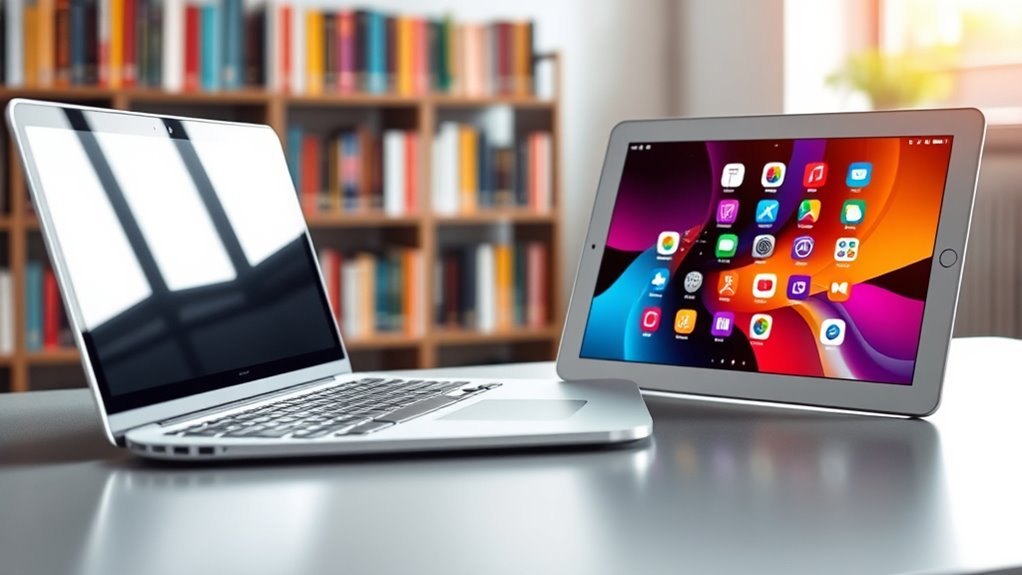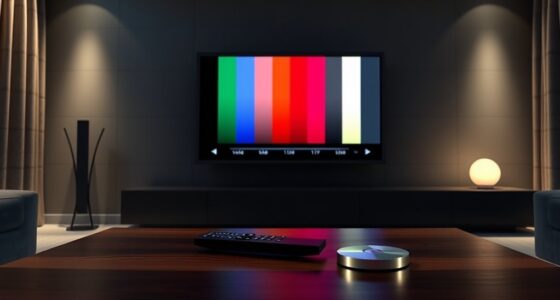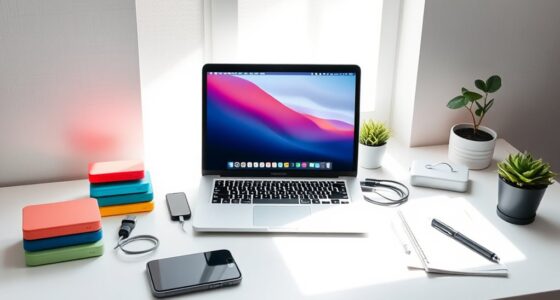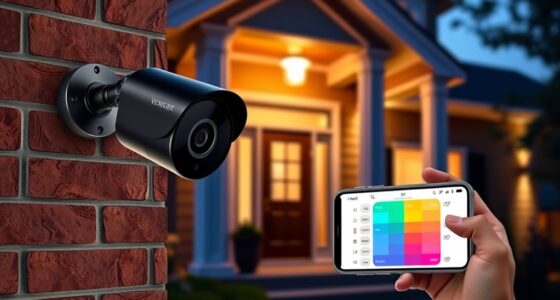Choosing between a laptop and a tablet depends on your academic needs, lifestyle, and budget. If you need powerful multitasking and a physical keyboard for typing, a laptop is your best choice. But if portability and quick access for note-taking or reading matter most, a tablet might suit you better. Both devices support online learning, but understanding their strengths and limitations helps you pick what’s right for your studies. Learn more about how to find the perfect fit for you.
Key Takeaways
- Laptops are ideal for intensive tasks, multitasking, and extensive typing, making them suitable for academic work and projects.
- Tablets are lightweight, portable, and great for reading, note-taking, and quick internet access on the go.
- Laptops offer more connectivity options and better performance for demanding software and collaborative tasks.
- Tablets are generally more affordable and convenient for casual use and digital learning apps.
- The choice depends on whether students prioritize productivity and multitasking or portability and ease of use.
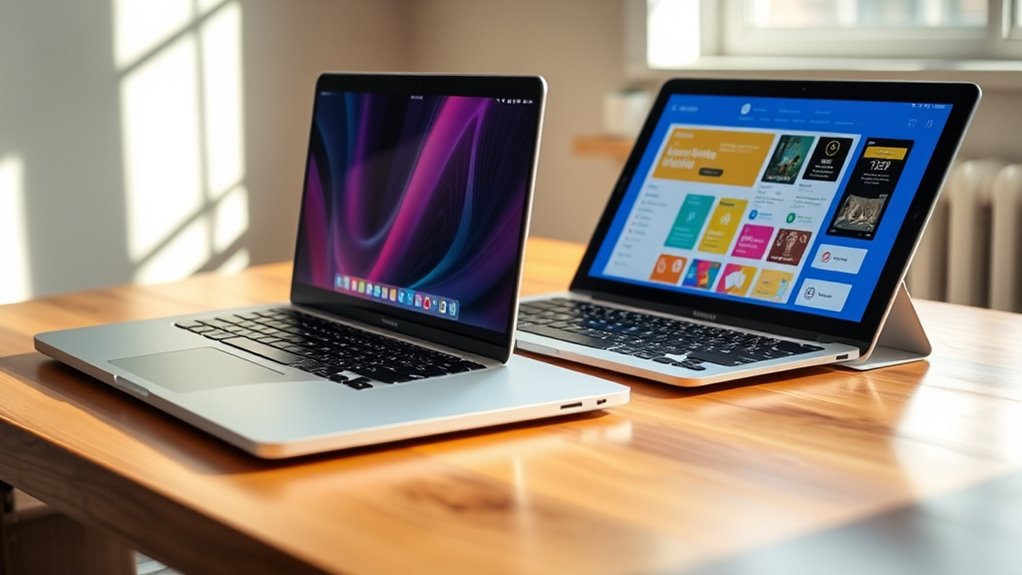
When choosing between a laptop and a tablet, understanding their respective strengths and limitations is essential. You’ll find that laptops are generally more powerful and suited for multitasking, but they tend to be heavier and less convenient for frequent travel. On the other hand, tablets are lightweight and easy to carry, making them ideal for students who move between classes or need a device that fits easily into a backpack. If you’re someone who needs a physical keyboard for typing essays or research papers, a laptop’s keyboard experience is far superior, allowing for faster and more comfortable input. However, if your primary tasks involve reading, note-taking, or sketching with a stylus, tablets excel due to their touchscreens and portability.
Connectivity options also play a role in your decision. Laptops usually offer more robust connectivity, supporting various ports and faster internet connections, which is essential for accessing online resources or transferring large files. Tablets, while capable of connecting to the internet via Wi-Fi or cellular data, may have limited ports and sometimes rely on external accessories for expanded connectivity. This can influence how seamlessly you can work on different projects or collaborate with classmates.
Performance capabilities are another key consideration. Laptops typically feature more powerful processors and better cooling systems, enabling them to handle intensive tasks like video editing, programming, or running heavy software. This makes them more suitable for students involved in demanding coursework or projects. Tablets, in contrast, are optimized for single-task efficiency, such as streaming videos, browsing the web, or using casual educational apps. Their hardware isn’t designed for heavy multitasking or high-performance software, but they’re excellent for quick, casual use or consuming content on the go.
Cost is often a deciding factor. Laptops tend to be more expensive, especially models with advanced features or high-performance specs. Budget-friendly options exist but might lack some functionalities necessary for more demanding tasks. Tablets are generally more affordable, making them accessible for students on a tight budget. You should also consider accessories; adding a keyboard or stylus can increase the overall cost of a tablet, but these tools can considerably enhance usability.
Educationally, laptops are better suited for tasks requiring extensive typing, research, and collaboration on projects, while tablets shine in interactive learning environments, digital textbooks, and apps designed for touch input. Both devices support online courses and educational resources, but your choice depends on whether you prioritize productivity or portability. Additionally, research indicates that the 16PF personality test can be valuable in understanding individual learning preferences and adapting study methods accordingly. Ultimately, understanding these differences helps you select the device that aligns with your academic needs, lifestyle, and budget.
Frequently Asked Questions
Which Device Offers Better Battery Life for Students?
When choosing between devices for students, battery life plays a key role. Laptops, especially high-end models like the HP OmniBook X 14 or Lenovo ThinkPad T14s, often last between 15 to over 25 hours, making them ideal for long days. Tablets typically provide around 10 to 15 hours of active use, which is great for portability and quick tasks. If you need extended usage, a laptop generally offers better battery longevity.
Can Tablets Replace Laptops for College Coursework?
You wonder if tablets can replace laptops for college coursework. While tablets are portable and great for media, they often fall short for intensive academic tasks. You’ll find that laptops support multitasking, complex software, and extensive typing better, which are essential for coursework. So, despite tablets’ growing popularity, they currently serve more as supplementary devices rather than full replacements for laptops in college studies.
Which Device Is More Durable for Everyday Student Use?
When you consider which device is more durable for everyday use, it depends on your handling habits. Tablets are generally more resistant to drops and are easier to carry, reducing damage risks. Laptops, with their robust build and protective hinges, can withstand daily wear better if handled carefully. Ultimately, your choice should align with how you treat your device, but tablets often offer better durability for rougher handling.
Do Tablets Support All Educational Software Needed?
You might wonder if tablets support all the educational software you need. While tablets offer access to many apps for learning, they don’t support every desktop-based program, especially complex or legacy software used in higher education. They excel at multimedia and interactive content, but for tasks requiring heavy processing, multitasking, or specialized tools, laptops often provide better compatibility and performance. So, consider your specific software needs before choosing.
Are There Affordability Differences Between Laptops and Tablets?
When comparing affordability, you’ll find that tablets often come out ahead as the cheaper option. You can find budget tablets starting around $100, making them easier on your wallet, especially if you’re on a tight budget. Laptops tend to be a bit more expensive, with basic models starting at around $200. So, if you’re looking to save a buck, a tablet might be your best bet, but consider what features you need most.
Conclusion
So, choosing between a laptop and a tablet isn’t just a decision—it’s like picking your ultimate academic weapon. Will you wield the unstoppable power of a laptop’s speed and multitasking genius, or prefer the sleek, portable magic of a tablet that transforms studying into an adventure? Either way, you’re about to conquer your coursework like a superhero. Just remember: your choice could make you the student of legends, capable of taking on the universe’s toughest assignments!

